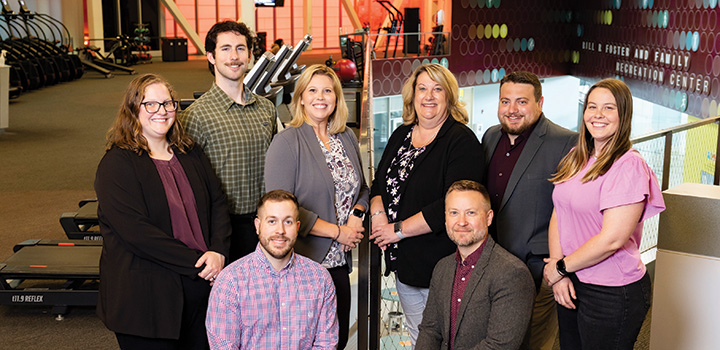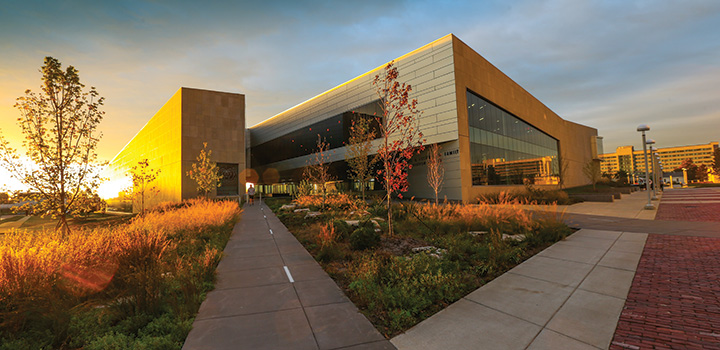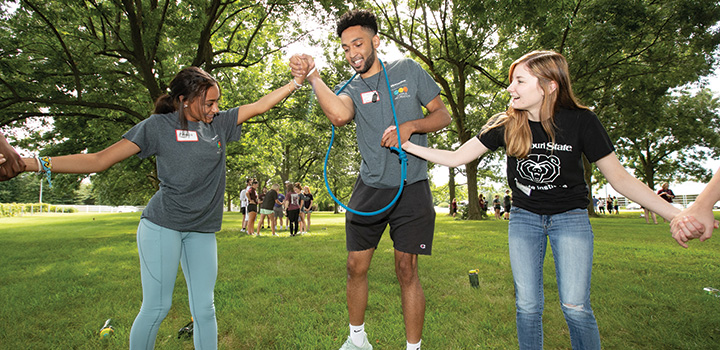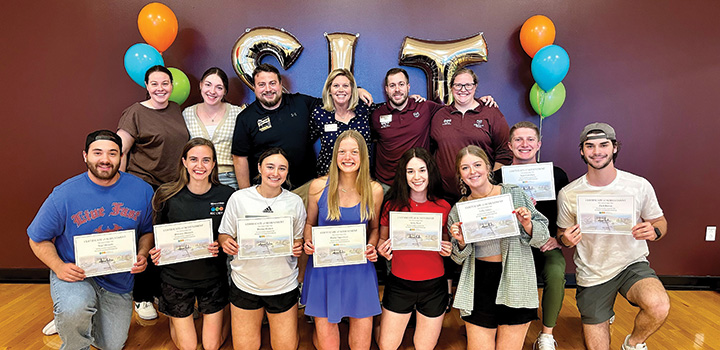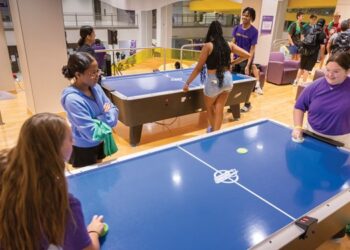Missouri State University (MSU) is a public affairs institution with three pillars that make up its DNA: cultural competence, community engagement and ethical leadership.
It was this difference that Ashleigh Lewellen noticed when she first came to MSU in December 2010. “It’s all based on becoming good citizens,” she said of the university’s goal. “So, I really connect with that mission.”
Lewellen joined Campus Recreation at MSU after a time spent in both municipal and military recreation. From her experience running youth programs in Japan to Parks and Rec in Nixa, Missouri, Lewellen found recreation can be practiced in a multitude of facets. “That’s what I love about rec,” she shared. “You can do community, campus, military and corporate/private rec. There are so many ways to impact people through that lens.”
EXTRA CREDIT: Increasing campus rec inclusiveness through community service.
However, Lewellen’s favorite way to fulfill that mission was through her work in higher education. As such, impact continued to be her word as she worked through the ranks of MSU, currently finding herself as the director of Campus Recreation. Today, the department is located in the Foster Recreation Center (FRC), which was built in 2012. It’s set apart because of its intentional design that creates a modern but inviting atmosphere. “It’s constructed and operated to welcome strong campus partnerships and collaborations,” said Lewellen of the space. “We have a huge dynamic space that can facilitate any event that supports diverse programming.”
Lewellen shared they host a wide variety of programs throughout the year. A few examples include:
Showcase, an Admissions event geared toward high school juniors where they can learn about faculty, student organizations and more at MSU. A local middle school’s Field Day celebration, which brings 700 middle schoolers onto campus, in addition to high school project graduations.
Upscale banquets, birthday parties or huge games of dodgeball are other events the facility has hosted.
Like MSU’s mission to make good citizens, Lewellen sees it as the job of Campus Recreation to be good citizens as well. She noted resources are limited for everyone. “For us to be the most impactful to our campus and to our students, we have to have the willingness to open our doors and to collaborate,” she said. “It’s one of the ways we can help fulfill our mission, because it’s about developing and making engaged citizens, so that doesn’t just mean playing rec sports.”
A Beloved Tradition at MSU
Plus, it brings in students who may never have come into the rec center prior. One event that does this exceptionally well is the annual Haunted Trail.
Now in its 11th year, for one night only each October the lower level of the FRC is transformed into a 12 to 15-minute-long haunted trail. Eric Vaughn, an associate director of Campus Recreation, explained they shut down the lower level around 1:30 p.m. the day of the event. With crowd control fencing, they create a trail through spaces like the elevator, laundry room, lower-level lobby, locker rooms, outside patio, etc. Student and professional staff hang props, paint signs, hide speakers and more to transform the space.
“We have seen tremendous growth in the last two years of this program,” said Vaughn, noting they reached a record of 930 students who went through the trail in the 2023-2024 academic year. “We’re trying to give students on campus a safe avenue to enjoy the spirit of Halloween for free on campus.”
While it’s an exhausting day — the trail is for one night only, with the rec center reopening the next day at 6 a.m. — the students love it. “It’s extremely fulfilling to see the students who come through and enjoy this event,” said Vaughn.
In fact, a cohort of students from the program known as Bear POWER — a 2.5 year, five-semester program geared specifically for students with intellectual and developmental disabilities — testified on a panel the Haunted Trail was their favorite thing they’d done at MSU.
EXTRA CREDIT: Crafting an experience — training leadership staff to understand their impact.
Plus, Campus Rec student staff working the trail get to take ownership of the different areas, creating a theme and decorating their assigned space. It’s turned into a program competition and has created a unique staff bonding opportunity.
All in all, it’s no small feat. Vaughn said they look to be creative each year, changing the route and themes. And he’s learned to put a lot into a good marketing and pre-event plan. “We’ve been really intentional with our marketing as it shows in the following data,” he said. “We’ve increased our attendance each year by about 200 to 300 students.”
Another program that’s been growing exponentially is Camp Claw. Started in the summer of 2022, there were plenty of obstacles: registering the camp with the state, aligning dining plans and sparking interest. In fact, Lauren Easter, an associate director of Campus Recreation who helps oversee Camp Claw, shared for their first camp week they had three campers.
But despite a bumpy start, Camp Claw continued and has seen increases each year averaging around 20%. “While it’s been challenging to continue to provide such a great program for our community, it 100% has many benefits and has been great for our facility over the summer when the majority of the students are not here,” said Easter.
Since COVID-19, MSU has seen an emptier campus during summers. Camp Claw brings a better energy to the FRC, which Easter pointed out is great for prospective students on tours to see the building alive with energy. Plus, it’s exposure for the FRC by campers and their families who may bring birthday parties, special events and school celebrations to the facility.
EXTRA CREDIT: Successful summer camp strategies.
In addition to that benefit, Easter shared Camp Claw has taught those in the department how to work with a completely different age group. This allows for engaging summer jobs for students.
Finally, Camp Claw looks to embody MSU’s good citizen mission as well. Easter said this year they are incorporating a different word of the day at camp. The words are positive character qualities they’re hoping to instill in the campers. “At the end of the day, campers will share how they practiced using these words in their day at camp and how they can continue to do so outside of camp,” she said.
Developing Student Staff
Beyond impacting students through big, community-reaching programs, Lewellen shared on a smaller-scale offering that’s looking to further MSU’s pillars: the Student Leadership Team. The program is 17 weeks long and consists of eight students. Meeting for two hours a week, their first seven to eight weeks during the fall semester consist of practical work. They must propose an event or program they would like to implement and work through the logistics of it.
The second half of the program in the spring semester is theory, focusing on the groups’ strengths and dynamics, conflict management skills, etc. In the next academic year, the goal is for the cohort to implement their program or event.
“This internal seminar provides future student leaders with valuable cross-functional experience from program ideation to completion,” said Lewellen. “This initiative not only develops strong leaders but also enhances the overall student experience by fostering a culture of leadership and responsibility.”
EXTRA CREDIT: Belonging — the true value of campus recreation.
But while creating good citizens is the goal, Lewellen and the Campus Recreation team understand they need to match that citizenship and teamwork mentality as well. As such, multiple of the professional staff serve in volunteer positions, from the Board of the Red Cross to NIRSA’s Championship Series. Plus, once a year as a team they serve at the Ozarks Food Harvest.
It all comes back to what Lewellen shared about what kept her at MSU. It’s creating good citizens, and Campus Recreation looks to emulate this within its own staff. The outpouring from that focus is evident whether it’s a spooky trail that serves 1,000 students in a night, or a cohort of eight that are walked through a leadership series.
“A good citizen works to better their space and the space of others by supporting others the way they would want to be supported,” said Vaughn.
It seems by that definition, Campus Recreation itself is a good citizen, using its space, people and more to support the campus, local community and beyond.


